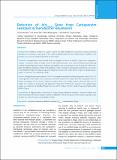Please use this identifier to cite or link to this item:
https://hdl.handle.net/20.500.14356/2297| Title: | Detection of blaoxa-23 Gene from Carbapenem-resistant Acinetobacter Baumannii |
| Authors: | Neupane, Laxmi Sah, Anil Kumar Rayamajhee, Binod Pokhrel, Anil Singh, Anjana |
| Citation: | NeupaneL., SahA. K., RayamajheeB., PokhrelA., & SinghA. (2023). Detection of blaoxa-23 Gene from Carbapenem-resistant Acinetobacter Baumannii. Journal of Nepal Health Research Council, 20(4), 899-905. https://doi.org/10.33314/jnhrc.v20i4.4257 |
| Issue Date: | 2022 |
| Publisher: | Government of Nepal; Nepal Health Research Council; Ramshah Path, Kathmandu, Nepal |
| Keywords: | Acinetobacter baumannii Antibiotic-resistant blaOXA-23 Carbapenemase Nepal |
| Series/Report no.: | Oct-Dec, 2022;4257 |
| Abstract: | Abstract Background: Antibiotic resistance is a great concern for public health and Acinetobacter baumannii-associated infections are increasing in many parts of the world, including Nepal. However, limited data is available on the prevalence of A. baumannii harboring blaOXA-23 from Nepal. Methods: A hospital-based cross-sectional study was designed to detect the blaOXA-23 gene from carbapenem-resistant A. baumannii isolates in Nepal. A total of 380 clinical specimens were collected and processed following standard microbiological procedures. Antibiotic susceptibility test was performed as per the protocol of the Kirby-Bauer disk diffusion technique and the CLSI guidelines, while screening of carbapenemase production was assessed by the Modified Hodge Test using meropenem (10µg) disc. The presence of the blaOXA-23 gene in carbapenemase-positive A. baumannii was confirmed by PCR. Results: Among 380 specimens analyzed, 210 (55.3%) samples were positive for bacterial growth, where 33(15.7% of total growth) of the isolates were A. baumannii, and most of them were isolated from the ICU patients (20/33, 60.6%) and sputum (16/33, 48.5%). Thirty-two isolates (97%) were colistin sensitive, while only four (12.1%) isolates were sensitive to meropenem and imipenem. Twenty-three (69.7%) of A. baumannii were carbapenemase positive as revealed by the Modified Hodge Test test, and 19 of them (57.6% of total A. baumannii) harbored the blaOXA-23 gene. Conclusions: A high prevalence of the blaOXA-23 gene among carbapenem-resistant A. baumannii isolates were found. Systematic network surveillance should be established to check the spread of such isolates, especially in the intensive care units of tertiary care hospitals in Nepal. Keywords: Acinetobacter baumannii; antibiotic-resistant; blaOXA-23; carbapenemase; Nepal |
| Description: | Original Article |
| URI: | https://hdl.handle.net/20.500.14356/2297 |
| ISSN: | Print ISSN: 1727-5482; Online ISSN: 1999-6217 |
| Appears in Collections: | Vol 20 No 04 Issue 57 Oct-Dec, 2022 |
Files in This Item:
| File | Description | Size | Format | |
|---|---|---|---|---|
| 4257-Manuscript-32168-1-10-20230720.pdf | Fulltext. | 509.45 kB | Adobe PDF |  View/Open |
Items in DSpace are protected by copyright, with all rights reserved, unless otherwise indicated.
